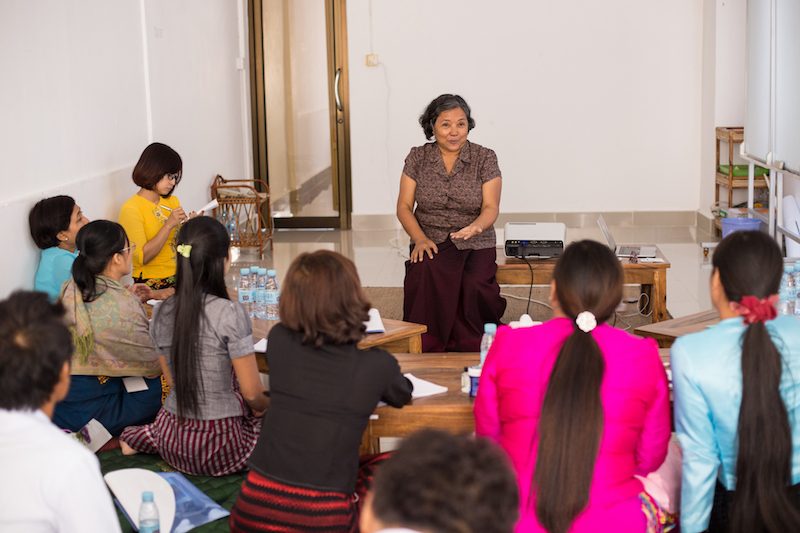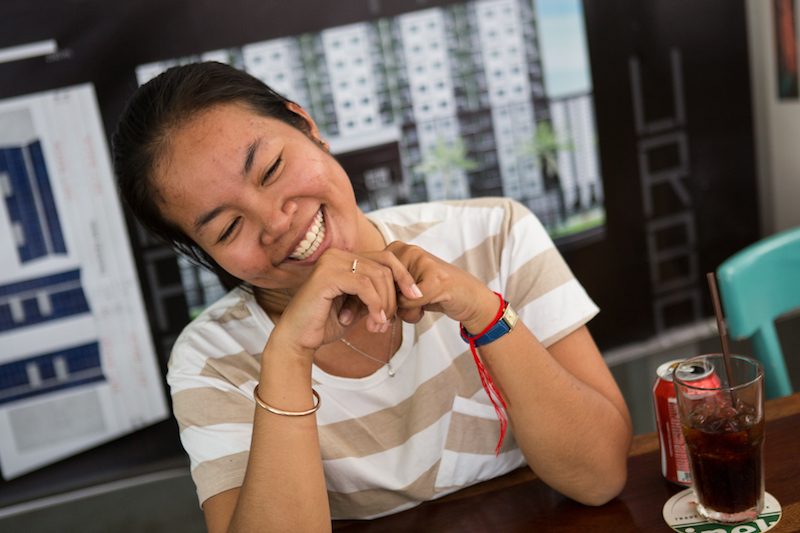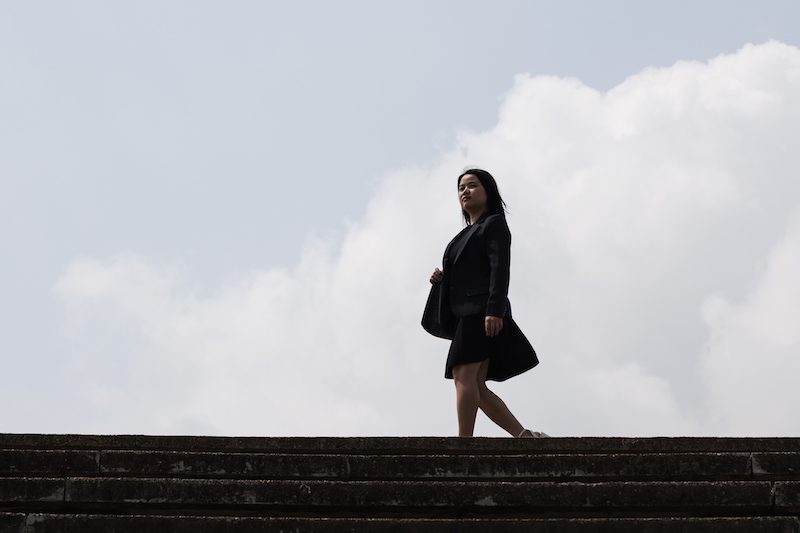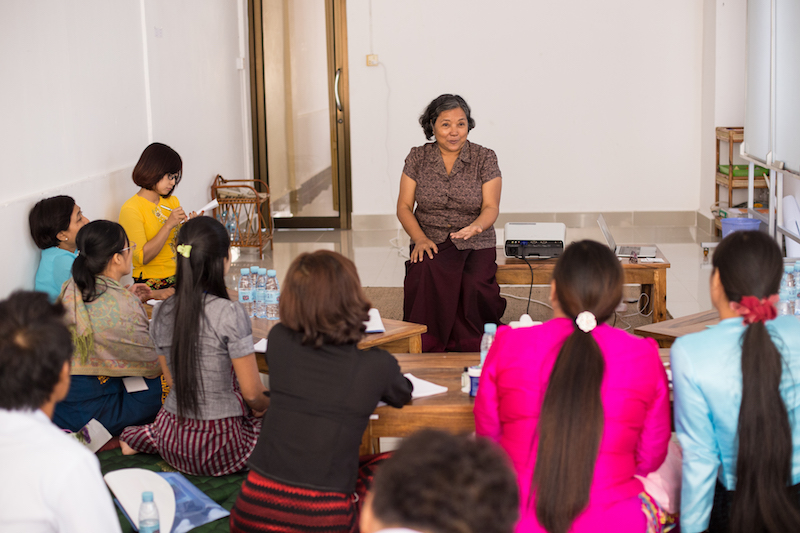As a young girl, Srun Keavatey would spend her days working in her mother’s grocery store, and at night, under the glow of a diesel lamp on the floor of their small thatch-roofed home, she would sit down to basic arithmetic and alphabet lessons taught by her parents. As a teenager, her father demanded that she give up her studies to focus on housework.
But she defied him, and pursued an education. More than a decade later, her life is a long way from her humble upbringing in Kompong Cham province’s Prey Chhor district, where her family still lives. Ms. Keavatey is now 23 years old, an investment manager for an infrastructure aid program where she directs spending toward clean water projects in rural villages much the same as the one where she was raised.

“I was committed to studying hard to get a high position so I could influence and make change in society, and also for my family, so they can have a better life,” she said, sipping on a smoothie at a Brown cafe in Phnom Penh last month.
Ms. Keavatey symbolizes a new wave of Cambodian women, striving for success and independence in the rapidly changing landscape of a fast-developing country, where gender roles are being redefined largely by an evolving economy.
Many of the girls Ms. Keavatey grew up with did not have dreams much beyond the traditional roles of being a wife and mother, as set out in “Chbab Srey,” or “Rules for Girls,” the traditional Khmer moral code that outlines appropriate conduct for Cambodian women.
The code of conduct was included in the national school curriculum until 2007, when the Women’s Affairs Ministry requested its removal. A shortened version of some of the rules, including “Happiness in the family comes from a woman,” is still taught in Grades 7 to 9.
“There are not a lot of women in my village who got to study in Phnom Penh, pursue a high education and get jobs, because they ended up getting married and having children,” Ms. Keavatey said.
“Sometimes I see that their parents block their opportunities,” she said.
“I think some parents still have the view, though some have changed their belief, that women need to get married and have children, and so they cannot do great things. We face lots of obstacles.”
For some women, feminism means having self-confidence, equal access to education, economic independence and a steady job. For others, it can mean being able to make autonomous decisions about family planning, or, like former entertainment worker Sim Sodaline, being treated equally within her community.
Ms. Sodaline, 25, said she learned how to exercise her rights from other women she met through the Gender Cafe, a pro-women initiative launched by Gender and Development for Cambodia in 2014.

About a dozen women—a mix of garment factory laborers, maids, victims of land grabs and entertainment workers, aged between 25 and 40 and living on the outskirts of Phnom Penh—meet bimonthly at the organization’s head office in Tuol Kok district, where they voice their concerns and discuss everything from victim blaming on social media to sex.
Sitting cross-legged among the group, Ms. Sodaline broke down as she spoke of being discriminated against by villagers who had begun to bully her family the moment her father walked out.
Her story of hardship and determination to transcend expectations is familiar to a generation of young women striving to secure their place in a society that frequently throws up obstacles.
Before her recent exit from a KTV parlor, Ms. Sodaline had mentored younger women and taught them to call out clients who disrespected their boundaries.
She has also become a Gender Cafe facilitator in her own commune, coordinating meetings that often become a safe space for women to share stories similar to her own.
Their conversations are by turns upsetting, defiant and funny.
Thida Khus, director of women’s leadership group Silaka, believes women today are more aware of their rights and less afraid to demand and strive for a better life than their mothers.
“First of all, economically, they can survive, support themselves. Secondly, they have more knowledge about who they are and what they want,” she said.
“They have the courage to ask ‘What is important to me, my happiness?’ and what that happiness means, so these women can define those things by themselves, and they can walk out, and they can sustain this decision.”
“They can also educate their families and people around them,” she added.
Ms. Khus said the change in attitudes between the generations of women was largely driven by necessity.

Cambodia’s development and rapidly evolving economy have forced families to redefine gender roles by sending more women into the workforce rather than relying on a single income.
A majority of factory workers, particularly in the garment sector—a lynchpin of the country’s economy—are women, while overseas work has also opened up opportunities.
“More women are working a professional job, more women are speaking and behaving professionally and are able to analyze situations,” Ms. Khus said. As a result, “society starts to give more credit to women, that she can do things that other people do.”
Ms. Khus is part of an organization that works in more than 100 communes training female candidates to run for office as part of wider efforts to improve women’s representation across all levels of government.
The government, she said, continues to cling to cultural beliefs that value a woman’s modesty.
“The government still has a lot of baggage: baggage of culture, tradition and the structure that they’re in, because it is controlled by men,” Ms. Khus said.
“Some of them will say it is unpatriotic if you are against tradition…so we have to unpack what tradition means.”
Women hold just 20 percent of seats in Cambodia’s national parliament, according to data gathered by the U.N. in 2015.
Senior CNRP lawmaker Mu Sochua has broken through a barrier, named recently as one of three vice presidents for her party. But she said women were still disadvantaged in the political arena.
“Society is not yet ready for competent women in politics,” Ms. Sochua said.
“When women are up for a higher position or opportunity, they are strictly questioned for their education, experience and lack of qualifications.”
“My experience is different as I have passed that stage. but my political activism has been judged severely,” she said.
Women politicians were also disadvantaged by disproportionate domestic responsibilities, further limiting their engagement, she added, while women at the top are given little opportunity to become role models for young women, stifled by a lack of public visibility.
“This does not help the image of women as strong, influential and speaking on behalf of women,” she said.
Hope lies in the hands of young women who are discovering their sense of value and making their voices heard. They are the product of a movement started decades ago by women who believed that equality and opportunity were their rights.
There is a lot of work left to do, however, said those at the forefront of efforts to improve recognition and practice of women’s rights.
Ros Sopheap, 55, has been central to Cambodia’s women’s rights movement for years. In 1995, she worked on a domestic violence research project, the first study of its kind in the country, and it inspired her to become more deeply involved.
Although societal attitudes toward women have changed over time, she believes many women have yet to take ownership of their own lives.
“Independent decision-making is really important. But you have to be responsible for your choice,” she said.
“I want Cambodian women to be able to analyze issues and make a choice, not following others, not bowing to pressure from others. Right now, we still have a lot of women who are following their parents, sisters, siblings.”
Noy Chhorvin, national coordinator for the women’s leadership NGO Cambodia Young Women Empowerment Network, said cultural beliefs still frequently undervalued women.
“When I go to my hometown, old people ask me ‘Where do you work?’ and when I tell them I work for women’s rights and promoting gender equality in Cambodia, they don’t speak anymore, but they say ‘When are you getting married?’”
“They say that because I have a high education, no man will be interested in me because I have a strong capacity and confidence,” she said.
Ms. Chhorvin said she discovered a passion for women’s rights after a tough start in life.
Her parents died within a year of each other from illnesses when she was a teenager, and her older sisters had to get work in a garment factory to support their other siblings.
“I felt a little afraid and hopeless about my life after my parents passed away because there was no one to support my education, and all of my relatives, they encouraged me to learn vocational skills like tailoring or going to work in a garment factory,” she said.
“But I started to learn more about problems women face, like domestic violence, and I realized something needed to be done to find justice and break the silence around that.”
Ms. Chhorvin said she found purpose in empowering women by teaching young people of both genders the importance of independence and confidence for young women, to help them break through Cambodia’s entrenched patriarchal structure.
“In the future, they will become mothers, they will become fathers, so when they understand the concept they will show others as well,” she said.
For Ms. Keavatey, her path from Kompong Cham to Phnom Penh has opened up a sense of possibility for her two younger sisters.
One is studying for two degrees—at the University of Economics and Finance and the Institute of Foreign Languages at the Royal University of Phnom Penh campus—while the other is in Grade 8 at high school.
“The older one is staying with me and under my guidance,” Ms. Keavatey said. “I usually encourage her to be independent and look for opportunities to improve herself and be ready for her future career.”
Ms. Keavatey said her message to other women was simple: “Women need to believe in themselves, and they need to fight for their rights.”




